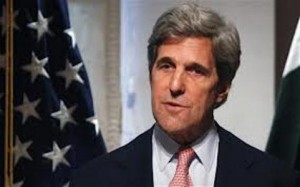 Secretary of State John Kerry said in an ominously worded warning that there could be "terrible consequences" if international negotiations aimed at curbing Iran's nuclear program don't show progress in the coming months.
Secretary of State John Kerry said in an ominously worded warning that there could be "terrible consequences" if international negotiations aimed at curbing Iran's nuclear program don't show progress in the coming months.The talks, which resume Tuesday in Kazakhstan, aren't expected to achieve a decisive breakthrough in the decadelong stalemate between the West and Tehran over its nuclear ambitions, U.S. and European officials involved in the diplomacy said.
But Washington and Brussels will press Iran to commit to a process in the coming months to end the most threatening element of its nuclear program, its production of near weapons-grade fuel, these officials said.
The U.S. and Europeans are willing, in turn, to ease some of the sanctions that have largely frozen Iran's banks out of the global financial system and spurred the collapse in the value of Tehran's currency, the rial, over the past year, officials said.
"There is still time, but there is only time if Iran makes the decision to come to the table and negotiate in good faith," Mr. Kerry said at a news conference in London on Monday with U.K. Foreign Secretary William Hague. "We are prepared to negotiate in good faith, in mutual respect, in an effort to avoid whatever terrible consequences could follow failure."
Mr. Kerry didn't specify the consequences and didn't commit to the use of U.S. military force if diplomacy stalls. But President Barack Obama has stressed that he would consider all options to deny Iran a nuclear weapon.
Israeli Prime Minister Benjamin Netanyahu has pressed the U.S. and the international community to be prepared to take military action against Iran's nuclear sites, potentially as early as the summer, to deny Iran from amassing enough fuel to produce a nuclear weapon. Iran says that its nuclear program is solely for peaceful purposes, and that it isn't seeking to develop an atomic bomb.
Iran has offered mixed signals heading into Tuesday's talks with representatives of the five permanent members of the United Nations Security Council, plus Germany, the so-called P5+1.
In recent weeks, Iran began to install second-generation centrifuge machines at its uranium-enrichment facility in the central Iranian city of Natanz. Nuclear experts believe the machines are providing Tehran with the technology to triple the pace at which it produces its nuclear fuel, and allow it to potentially "break out" and quickly achieve a nuclear-weapons capability.
At the same time, however, Iran has been converting a portion of its stockpile of uranium enriched to 20% purity�near weapons-grade�into fuel rods for use in Tehran's research reactor. The process makes the fissile material virtually unusable in a weapons program, according to officials from the U.N.'s nuclear watchdog, the International Atomic Energy Agency.
U.S. and European officials believe Tehran is seeking to expand its stockpile of 20%-enriched uranium to just below the amount�roughly 250 kilograms�that would be required to produce one nuclear weapon, if the material were processed further. The IAEA last week calculated Iran's stockpile of this nuclear fuel at 167 kilograms.
Over the weekend, Iran's chief nuclear negotiator, Saeed Jalili, said Iran wouldn't make any concessions that limit its right to enrich uranium under the U.N.'s Non-Proliferation Treaty.
U.S. officials said they hoped the first top-level negotiations in eight months would see Iran seriously discuss an updated offer from the P5+1, which would include the lifting of the ban by the U.S. and European Union of trade with Iran in gold and precious metals.
But Western diplomats said there also would be new demands of Tehran because of the advances it is made since June 2012. The U.S. is pressing for the shutdown of Iran's enrichment facility near the holy city of Qom, which is buried underground and seen as largely impregnable to military attack.
U.S. and European officials have stressed that they aren't prepared yet to lift an embargo that bans energy imports from Iran or the sanctions on Iran's central bank.
The U.S. hopes Iran will agree to a fresh round of talks�possibly at the level of nuclear experts�before the Iranian new year in mid-March.
The Obama administration has sought to have a direct bilateral meeting with Mr. Jalili in Almaty, according to U.S. officials. But they are doubtful that Iran will agree.
Supreme Leader Ayatollah Ali Khamenei, the ultimate arbiter on Iran's foreign policy, has already come out against such discussions. And Iran's government is seen as hesitant to commit to any serious discussions ahead of June presidential elections in Tehran.
Supreme Leader Ayatollah Ali Khamenei, the ultimate arbiter on Iran's foreign policy, has already come out against such discussions. And Iran's government is seen as hesitant to commit to any serious discussions ahead of June presidential elections in Tehran.
U.S. and European officials said they are committed to significantly increasing sanctions on Iran if it doesn't respond substantively in Almaty. Leading U.S. lawmakers on Monday signed a letter to EU officials seeking a ban on all transactions with Iran in euros.
"I think there would be continued pressure and continued sanctions enforcement�they are not done yet," a U.S. official said. "It's an ongoing process of additional designations, additional closing of loopholes. There are other areas of pressure."
By The Wall Street Journal
The Iran Project is not responsible for the content of quoted articles.










